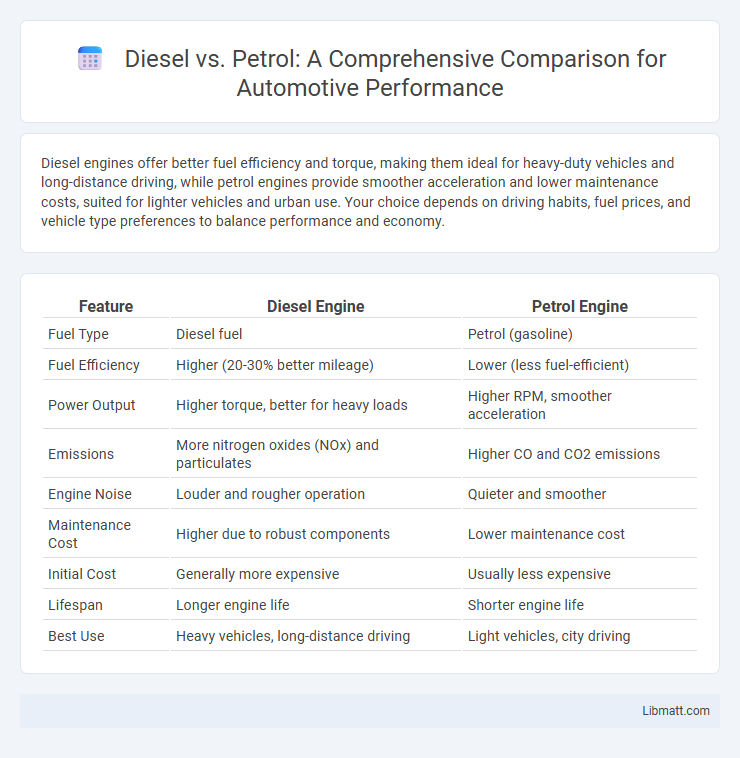Diesel engines offer better fuel efficiency and torque, making them ideal for heavy-duty vehicles and long-distance driving, while petrol engines provide smoother acceleration and lower maintenance costs, suited for lighter vehicles and urban use. Your choice depends on driving habits, fuel prices, and vehicle type preferences to balance performance and economy.
Table of Comparison
| Feature | Diesel Engine | Petrol Engine |
|---|---|---|
| Fuel Type | Diesel fuel | Petrol (gasoline) |
| Fuel Efficiency | Higher (20-30% better mileage) | Lower (less fuel-efficient) |
| Power Output | Higher torque, better for heavy loads | Higher RPM, smoother acceleration |
| Emissions | More nitrogen oxides (NOx) and particulates | Higher CO and CO2 emissions |
| Engine Noise | Louder and rougher operation | Quieter and smoother |
| Maintenance Cost | Higher due to robust components | Lower maintenance cost |
| Initial Cost | Generally more expensive | Usually less expensive |
| Lifespan | Longer engine life | Shorter engine life |
| Best Use | Heavy vehicles, long-distance driving | Light vehicles, city driving |
Introduction to Diesel and Petrol Engines
Diesel and petrol engines operate on different combustion principles, with petrol engines using spark ignition and diesel engines relying on compression ignition. Petrol engines typically burn a mixture of air and gasoline vapor, producing faster combustion suitable for lighter vehicles. Diesel engines compress air to a high temperature, igniting the injected diesel fuel, which provides greater fuel efficiency and torque for heavy-duty applications.
Core Differences Between Diesel and Petrol
Diesel engines use compression ignition where air is compressed to ignite fuel, resulting in higher fuel efficiency and torque compared to petrol engines that rely on spark ignition. Diesel fuel has a higher energy density, leading to better mileage and performance in heavy-duty vehicles, while petrol engines typically provide smoother acceleration and quieter operation. Your choice depends on factors like fuel economy, maintenance costs, and driving conditions, as diesel vehicles often excel in long-distance travel and heavy loads.
Engine Efficiency and Performance
Diesel engines deliver higher fuel efficiency by extracting more energy from fuel through higher compression ratios, resulting in better mileage compared to petrol engines. Petrol engines typically offer smoother acceleration and higher RPMs, which can enhance performance in lightweight vehicles and sporty driving conditions. Your choice between diesel and petrol should consider whether you prioritize fuel economy or dynamic engine responsiveness.
Fuel Economy Comparison
Diesel engines typically offer better fuel economy than petrol engines due to higher energy density and greater thermal efficiency, resulting in fewer liters consumed per kilometer. Your choice between diesel and petrol can significantly impact fuel costs, especially if you drive long distances regularly. Diesel vehicles often achieve 20-35% better mileage compared to their petrol counterparts, making them more economical for heavy usage.
Environmental Impact and Emissions
Diesel engines typically emit lower carbon dioxide (CO2) levels compared to petrol engines, making them more fuel-efficient and beneficial for reducing greenhouse gases. However, diesel vehicles produce higher amounts of nitrogen oxides (NOx) and particulate matter (PM), which contribute to air pollution and respiratory problems. Your choice between diesel and petrol should consider these environmental trade-offs, especially in urban areas with strict emission regulations.
Maintenance and Longevity
Diesel engines typically require less frequent maintenance due to their robust construction and slower engine speeds, which contribute to longer engine lifespan compared to petrol engines. Petrol engines often demand more regular maintenance intervals, including spark plug replacements and ignition system checks, impacting overall longevity. Proper servicing and quality fuel use are critical factors that determine the durability and maintenance costs of both diesel and petrol vehicles.
Cost of Ownership
Diesel vehicles typically offer lower fuel consumption and better mileage, reducing fuel expenses over time compared to petrol engines. Maintenance costs for diesel engines can be higher due to more complex components like turbochargers and particulate filters. Initial purchase prices for diesel models often exceed those of petrol counterparts, influencing the overall cost of ownership calculation.
Driving Experience and Power Delivery
Diesel engines offer higher torque at lower RPMs, providing strong pulling power and efficient acceleration, ideal for heavy loads and long-distance driving. Petrol engines typically deliver smoother power delivery with higher RPM ranges, resulting in a more responsive and sportier driving experience. Your choice between diesel and petrol will impact fuel efficiency, engine noise, and how power is experienced during daily commutes or spirited drives.
Availability and Infrastructure
Diesel fuel is widely available in commercial and heavy-duty transportation sectors, supported by an extensive infrastructure of fueling stations, especially along highways and industrial zones. Petrol stations remain more common in urban and suburban areas, ensuring easy access for everyday personal vehicles. Your choice between diesel and petrol depends on local fuel availability and the presence of servicing facilities suited to each engine type.
Choosing the Right Option for Your Needs
Choosing between diesel and petrol depends largely on your driving habits and vehicle usage. Diesel engines offer better fuel efficiency and torque, making them ideal for long-distance driving and heavy loads, while petrol engines provide smoother acceleration and are generally cheaper to maintain, suited for city commuting and shorter trips. Consider fuel costs, environmental impact, and initial purchase price to find the option that aligns with your budget and driving requirements.
Diesel vs Petrol Infographic

 libmatt.com
libmatt.com